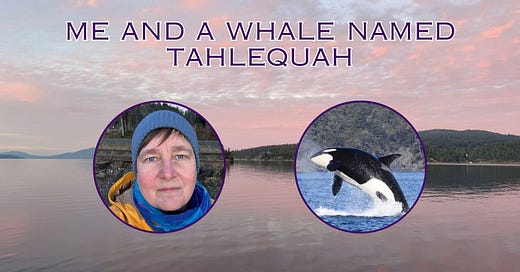I can’t get Tahlequah off my mind. Twice now, she has carried the bodies of her dead babies for days.
I made the short video above in honour of Tahlequah. Sometimes I sit by the shore of the Salish Sea and imagine having a conversation with her.
Here’s the script of the video…
Somewhere in these waters swims a whale named Tahlequah. Last month, Tahlequah’s baby died and she carried her baby’s lifeless body for at least 11 days. Back in 2018, Tahlequah did the same for another baby she lost, carrying that baby for 17 days. Sometimes members of her pod assist in carrying her dead babies so that she can eat. In 2016, Tahlequah lost a sister and she adopted her sister’s two offspring, until one, that was still milk-dependent, starved to death.
Sometimes I come to sit by these waters and I imagine myself having a conversation with Tahlequah. I feel a kinship with her, because I, too, carried my dead baby. Back in 2000, my son Matthew was born dead. The evening of his birth, family and friends gathered in my hospital room and we passed his lifeless body from hand to hand as we grieved him.
Matthew changed my life. I grieved him in a full-bodied way, especially when my breasts filled with milk that would never feed a baby. His death thrust me into liminal space, and for about ten years, I felt like I was wandering in a desert. My beliefs shifted, my worldview changed, and in the end, I left my career, my church, and my faltering marriage. After that profound experience of grief, I simply couldn’t go back to the way things were before.
Francis Weller says that the two great sins of western civilization are anaesthesia and amnesia. Instead of facing the grief of these liminal spaces, we are numbing out and choosing to forget.
As she carries her dead baby, occasionally sharing glimpses with the world, Tahlequah invites us to wake up and remember. By her example, she urges us to feel our grief, to carry our dead with us, to let ourselves be lost in liminality for awhile. One of the reasons for all of these deaths in Tahlequah’s family is the loss of their food source - the salmon that swim in these waters. Resident killer whales are facing extinction in the Pacific Northwest, while we numb out to the harm that our species is doing to our beautiful home.
Will we accept Tahlequah’s invitation? Will we journey with her in this grief? I believe we must. I believe it’s urgent that we wake up, hold our dead, and let ourselves feel the grief. Carrying our dead means not looking away when we lose species, or our trans teenagers die by suicide. It is only by entering the grief of this liminal space that we can be fully human, that we can see ourselves as interwoven with all living beings, and that we can usher in what Joanna Macy calls The Great Turning.
Will you explore this further with us? Join us for Leadership for Liminal Spaces, a series of webinars and study groups that will help us navigate grief and liminality with courage and grace.














Share this post